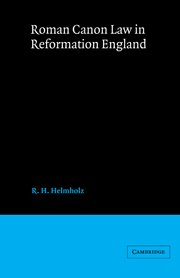Book contents
- Frontmatter
- Contents
- Preface
- List of abbreviations
- Table of statutes
- Table of cases
- 1 THE MEDIEVAL INHERITANCE
- 2 THE FORTUNES OF ECCLESIASTICAL JURISDICTION
- 3 DEVELOPMENTS IN LAW AND LEGAL PRACTICE
- 4 THE LITERATURE OF CIVILIAN PRACTICE
- 5 THE CIVILIANS AND ENGLISH COMMON LAW
- Appendix 1 Manuscript copies of Clerke's Praxis
- Appendix 2 Ecclesiastical reports, 1580–1640
- Index
1 - THE MEDIEVAL INHERITANCE
Published online by Cambridge University Press: 24 November 2009
- Frontmatter
- Contents
- Preface
- List of abbreviations
- Table of statutes
- Table of cases
- 1 THE MEDIEVAL INHERITANCE
- 2 THE FORTUNES OF ECCLESIASTICAL JURISDICTION
- 3 DEVELOPMENTS IN LAW AND LEGAL PRACTICE
- 4 THE LITERATURE OF CIVILIAN PRACTICE
- 5 THE CIVILIANS AND ENGLISH COMMON LAW
- Appendix 1 Manuscript copies of Clerke's Praxis
- Appendix 2 Ecclesiastical reports, 1580–1640
- Index
Summary
In the middle of the fifteenth century, the courts of the Church exercised jurisdiction over broad though not unlimited areas of English life. The principal boundaries of that jurisdiction must have seemed well settled at the time. At least they had been long observed, in fact since a time of dispute and settlement more than one hundred and fifty years before, during the reigns of Edward I and his son. A few matters of serious contention with the courts of the King did exist, flaring into occasional dispute when the stakes were high enough. There were also many matters of disagreement that could have separated the courts of Church and Crown, had either side attempted to implemented the full extent of its jurisdictional claims. But this did not happen. The surviving records reveal a remarkable stability in the subject matter jurisdiction of the English courts Christian.
As things stood, the ecclesiastical courts dealt with all questions involving the formation and annulment of marriage. That is, causes (the canonical word used for law suits) brought to enforce contracts of marriages entered into by words of present consent, to secure judicial separations on the grounds of adultery or cruelty, and to dissolve de facto marriages contracted contrary to the canonical impediments, all belonged to the courts of the Church. So too did exclusive probate jurisdiction in most parts of England. The ecclesiastical tribunals proved all last wills and testaments not involving freehold property, and they supervised the collection of the assets of decedents and the payment of debts and legacies out of those assets. Moreover, the courts of the English Church provided the sole remedy available for defamation.
- Type
- Chapter
- Information
- Roman Canon Law in Reformation England , pp. 1 - 27Publisher: Cambridge University PressPrint publication year: 1990

